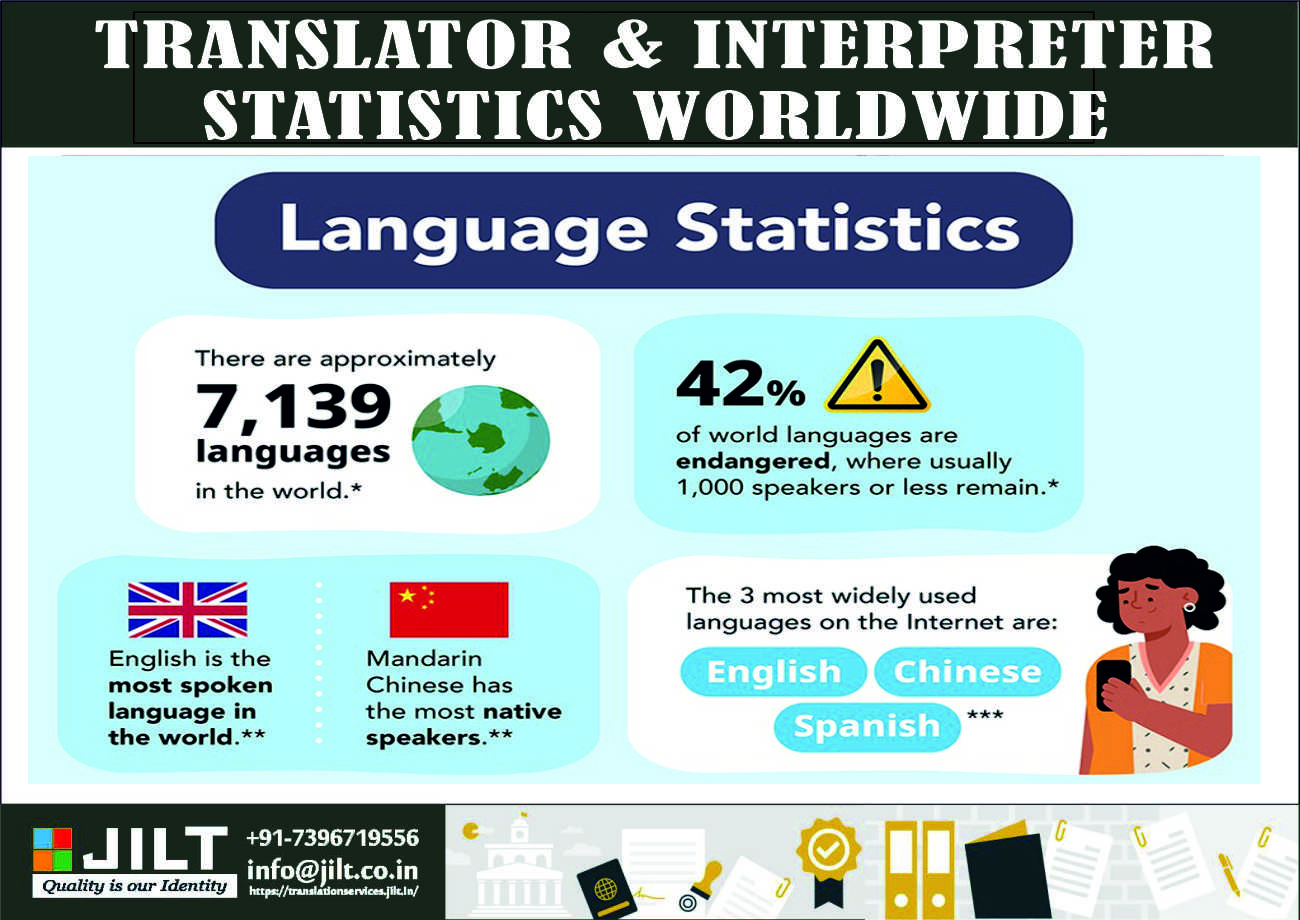
TRANSLATOR & INTERPRETER STATISTICS WORLDWIDE
by Dr. Abu Mazhar Khalid Siddique - January 23, 2024
The growing need for translation services is closely tied to the dedicated work of professional translators, interpreters, and editors. These individuals play a crucial role in facilitating language communication in many industries. The necessity of fluent cross-cultural communication in today's globalized world has caused a meteoric rise in the demand for language experts. As a result, a myriad of freelance opportunities have emerged, allowing people all around the globe to make use of their language skills.
The need for competent translators and interpreters has grown substantially in today's globally interconnected economy. To ensure that information is accurately transmitted and culturally resonant across different markets, these language professionals bridge linguistic divides. Their skill goes beyond literal translation; they have a knack for picking up on cultural subtleties, idioms, and language quirks, allowing them to convey ideas that cut through language barriers.
There is a dynamic and ever-changing landscape reflected in the statistics of the translation and interpretation sector. The demand for language services has seen a significant surge as more and more firms understand the strategic value of efficient communication in multiple languages. The language services market is seeing explosive expansion, and it's not only from established businesses. Newer industries like computing, healthcare, and e-commerce are all playing a big role.
For people who want to use their language abilities while having the freedom of working from home, freelance jobs in this field have become a very attractive choice. A worldwide industry for language services has emerged thanks to the proliferation of digital platforms and technologies that allow for easy communication between customers and freelancers. A varied group of specialists can now engage with customers worldwide because to this paradigm change, which has democratized access to translation and interpretation employment.
Global Linguistic Architects:
In the dynamic realm of global communication, a formidable cohort of approximately 640,000 translators stands as a linchpin, orchestrating the seamless exchange of ideas across linguistic frontiers. These language virtuosos, adept in diverse fields from technical to creative, play a pivotal role in meeting the escalating demand for precise cross-cultural communication. Their influence extends across industries, enhancing international business endeavors. Technological integration further empowers these professionals, as they deftly navigate digital tools for heightened efficiency. As stewards of language, these translators embody a critical nexus, facilitating meaningful connections and cultural understanding in our interconnected global landscape.
Rise to the Top of the Economy in Language Services:
As 52% of language service professionals report a respectable increase in overall income over the past two to three years, a captivating narrative unfolds inside this dynamic area. A persistent demand for language skills in our globalized society is reflected in this financial ascent. The ever-increasing demand highlights the critical need of language experts in many fields, from commerce to IT. The importance of effective cross-cultural communication is growing as the globe gets more linked, making these professionals indispensable to global achievements. In addition to indicating a financial upturn, this data emphasizes the strategic importance of language services in the dynamics of modern global business.
Experts in the Field of Languages Embrace the Freedom of Freelancing:
A paradigm shift was noted in a 2020 study of 7,000 professional translators and interpreters when it was shown that 75% of respondents had taken the plunge into self-employment, exemplifying the freedom that comes with being a freelancer. This number highlights a general tendency in the language services sector, where qualified individuals are choosing to work independently more and more. This shift towards entrepreneurship is driven by the appeal of global reach, diversified project engagements, and flexibility. These independent professionals, who work as linguistic builders in a multilingual society, not only alter the boundaries of communication but also reshape the conventional job market, mirroring the changing dynamics of the translation and interpretation industry.
Interpretation & Translation from Around the World:
With a combined experience of 178 nations and 155 language pairs, the 7,000 professional translators and interpreters present bring a mosaic of linguistic skills to the table. The diverse and expansive character of the language services sector is highlighted by this international orchestra of talent. Every specialist in this vast network acts as a cultural ambassador, helping people from different backgrounds understand one another and communicating effectively across boundaries. The industry's collaborative fabric is enhanced by the diversity in geographical representation and linguistic acumen, which further highlights the vital role these experts play in promoting cross-cultural understanding on an incredibly global level.
Client Acquisition and Delivery Dynamics: Overcoming Translational Obstacles:
Difficult problems arise in the complex field of translation, namely in acquiring clients and striking a balance between pricing and delivery expectations. Securing clients in a competitive marketplace requires a combination of strong marketing skills and fluency in the target language. In addition, there is always the problem of meeting customer expectations when it comes to cost and delivery dates. Negotiation acuity is key to finding a happy medium between budgetary constraints and the need to keep delivery times and quality high. Experts in translation must master not just the nuances of language but also the complexities of client relationships, financial concerns, and the never-ending quest for professional excellence.
The Freelance Translator Education Landscape:
A 2020 survey found that 93% of freelance translators have degrees. This statistic shows language specialists' academic dedication, making them highly educated contributors. Linguistics accounts for 39% of these degrees, indicating a strong focus on language skills. Freelance translators react to language developments and industry advances by continuing their education. This educated generation shows the profession's intellectual rigor and emphasizes the importance of academic proficiency and practical application in translation's complex environment.
Gender Differences in the Rates of Freelance Translation:
Female translators, on average, charge 7% more per word than male translators, revealing a subtle gender dimension in the freelance translation industry. This shift reflects the growing appreciation for expertise in the field. There is a clear gender gap in price arrangements, as male translators want a minimum charge that is five percent higher. We need to go deeper into the causes causing pricing differentials since this complicated landscape highlights the need of acknowledging gender dynamics in the market. In order to create a fair and inclusive space for freelance translators, it is crucial to grasp these nuances.
The impact of professional associations on freelance translator fee increases:
Translators who are members of professional associations typically charge 30% more than those who are not, according to an interesting correlation that is emerging in the ever-changing field of freelance translation. This scenario highlights the practical benefits that individual practitioners derive from their association affiliations, going beyond just being a certificate. Professional organizations typically provide their members with resources that help them become more proficient, such as opportunities for networking and quality assurance, as well as access to continuing education. So, customers know and trust specialists who are part of established associations, and they are prepared to pay more for their services. In a very competitive and selective market, our discovery highlights the strategic benefit of professional affiliations in increasing the perceived and actual worth of freelance translators.
Efficient Specialization Strategy Effects:
An important finding emerges from the freelance translation landscape: translators with just one or two areas of expertise may charge 29% more than those without any specialization at all. In the highly competitive language services industry, this highlights the concrete importance of specialized knowledge. Clients value and appreciate specialists for the extensive knowledge and accuracy they bring, making them highly sought-after professionals. By taking a strategic approach, translators can increase their marketability and demonstrate how important it is to fulfill the changing demands of the industry through the development of specialized abilities.
Translation Companies vs. Direct Clients in Rate Negotiations:
There is a noticeable pattern to the fee discussions in the translation industry: agencies are 2.5 times more likely than direct clients to ask for a decrease in rates. The fact that these inquiries come from agencies to a considerable 77% of freelance translators highlights the cost pressure that is common in this industry. Compared to this, just 41% say they have had comparable discussions with direct clients. This dynamic illuminates the specific difficulties encountered by language professionals when interacting with agencies, leading to a detailed investigation of the elements impacting price expectations and negotiations, and ultimately impacting the fine line between compensation and the development of genuine client relationships.
Inequalities in Language Professional Certification:
Notably, 52% of respondents admit to not having official accreditation as a translation or interpreter in their original language, according to the survey. A closer look at the varied routes and credentials within the language services profession is warranted in light of this, since it highlights the changing landscape in which a large group works without conventional certifications.
Conclusion
An enthralling story emerges when one explores the vast universe of translator and interpreter statistics on a global scale, revealing the ever-changing terrain and developing tendencies of the language services sector. There is a diverse community of 640,000 language professionals, representing 178 countries and 155 language pairs. This diverse workforce is driven by the surge in demand for linguistic expertise, which is accentuated by the proliferation of global business interactions.
The data further shows that these professionals are entrepreneurial at heart; 75% of them have opted for the freelancer's path to independence. Problems including acquiring clients, negotiating prices, and dealing with gender-based rate differentials make the occupation even more complicated and call for business savvy in addition to language skills.
The fact that professional groups have a significant impact on pricing and that 93% of freelance translators have bachelor's degrees further highlights the multifaceted character of this industry.
Language experts are more than simply translators; they build bridges across cultures, act as ambassadors to help people understand one another, and add to the global conversation as we explore the complexities of this dynamic sector. These numbers paint a fascinating picture of a field that has weathered the storms of our linked world and is adapting quickly to meet the changing demands of a global community that places a premium on clear expression. Finally, the world's translators and interpreters are more than just a number; they are a powerful collective that is changing the story of cross-border communication and understanding.
Our organization employs native-speaking translators who can provide certified translation services in any language. We provide translation services in English (Urdu), Arabic (Spanish), German (French), Persian (Iranian), French (Italian), Japanese (Korean), Russian, and any other Indian or local language. Expert proofreaders at our company will inspect the translation. We also provide a courier service to deliver completed documents to our clients.
- Also Read :- THE SIGNIFICANCE OF PROFESSIONAL SUBTITLE SERVICES
- Also Read :- PROCEDURES AND DOCUMENTS REQUIRED TO OBTAIN US VISA.
- Also Read :- Arabic Translation Services
- Also Read :- FIR Copy Translation Services
- Also Read :- TRANSLATION VISIT
- Also Read :- Covering Letter Translation Services
- Also Read :- HOW TO MAKE AN SEO-OPTIMIZED MULTILINGUAL BLOG ?
- Also Read :- Bill of Lading (Groupage) Translation Services
- Also Read :- IMPORTANCE OF ISLAMIC FATWA TRANSLATION FROM URDU TO ENGLISH
- Also Read :- Journals Document Translation Services
Search
Categories
Archives by Month
Popular Blog
QUICK TRANSLATION QUOTE
Need help with a translation?
Get in touch with us
Whether you have a specific project you want to discuss, need a translation quote or simply want to discuss your requirements, do not hesitate to get in touch with us.











Social Networks